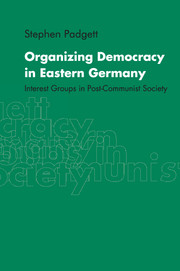Book contents
- Frontmatter
- Contents
- List of tables
- List of abbreviations and glossary
- Introduction
- 1 The emergence of civil society
- 2 Socio-economic foundations
- 3 Organization
- 4 Participation and the logic of collective action
- 5 Group dynamics
- 6 Organized interests, the state and public policy
- Conclusion
- References
- Index
Conclusion
Published online by Cambridge University Press: 22 September 2009
- Frontmatter
- Contents
- List of tables
- List of abbreviations and glossary
- Introduction
- 1 The emergence of civil society
- 2 Socio-economic foundations
- 3 Organization
- 4 Participation and the logic of collective action
- 5 Group dynamics
- 6 Organized interests, the state and public policy
- Conclusion
- References
- Index
Summary
This book began by outlining a number of hypotheses, generated from group theory, concerning the sort of associational order we might expect to see emerging from post-communist society. Group theory locates the origins of association in the issues and cleavages arising in economic life, with interest group configurations reflecting the structure of capital, employment relations and labour market dynamics. Post-communist societies in the early stages of market transition, it was suggested, were insufficiently differentiated to generate associational activity on pluralist lines. Whilst market transition could be expected to break up the monolithic structures of communist society, it was unlikely to generate the sharply defined cleavages and cohesive social formations that gave birth to associational activity in industrial society. Instead, I postulated a pervasive process of social dealignment and the emergence of rather fluid and atomized societies in which the conditions for interest group formation would be singularly unfavourable.
With politics and society in east/central Europe still in flux, the outline of associational order has yet to emerge in sharp relief. Nowhere have we found even the semblance of a stable, fully functioning interest group system. In some countries, of course, interest group formation is prejudiced by the economic instability and chaos accompanying market transition. Elsewhere it is retarded by the slow pace of political and economic transformation, which leaves society relatively undifferentiated, with an economic elite dominated by a reconstituted nomenklatura and a few successful commercial magnates coexisting uneasily with an impoverished mass.
- Type
- Chapter
- Information
- Organizing Democracy in Eastern GermanyInterest Groups in Post-Communist Society, pp. 166 - 178Publisher: Cambridge University PressPrint publication year: 1999



